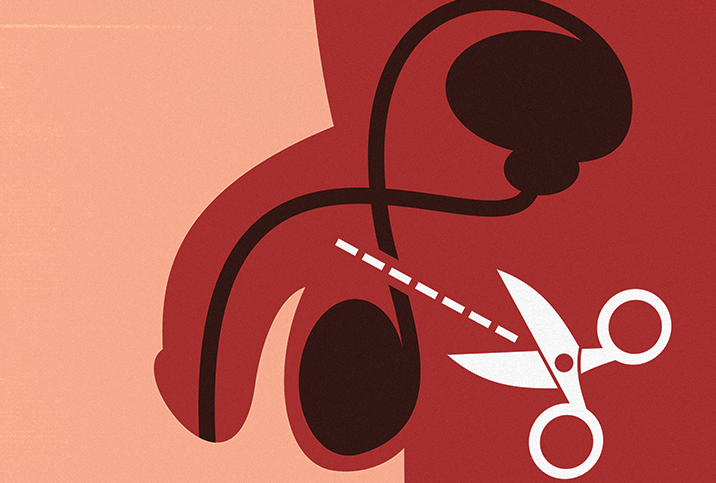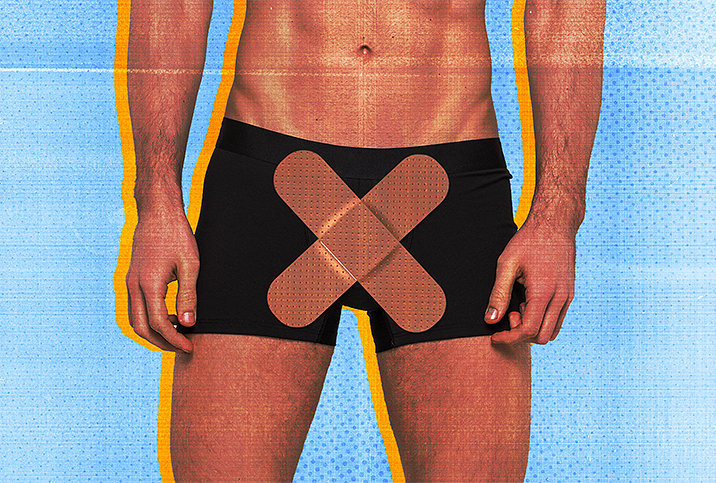What Getting a Vasectomy Is Really Like

It wasn't until I was on the train to the doctor's office that I experienced my first pangs of doubt or regret about getting a vasectomy. In this moment, I realized how big a decision it was to get that little snip. After all, you're taking a perfectly functioning part of your anatomy and choosing to halt it. You're "fixing" something that ain't broke.
More than that, you're disqualifying yourself from making future contributions to the gene pool—at least, naturally. You're deciding to be sterile. Yes, I have three kids. But what if I want 11 more?
Doubts crept. Seeds of panic tried to germinate. In response, I did the easiest thing anyone can do in such a situation: nothing. I stayed the course.
Six weeks later, I'm glad I did.
Why get a vasectomy?
You get a vasectomy because you don't want to have children. Pretty simple. And that's a decision my doctor, Bruce Sloane, M.D., of Philadelphia Urology Associates, said he sees most typically from men in their 30s who've had a couple of children and are set in that department.
"Now we're seeing a lot more people, including people in their 20s, who absolutely do not want children," Sloane said. "There's a lot of couples, also childless, who don't want kids."
News reports indicate the interest in vasectomies has increased since the Supreme Court overturned Roe v. Wade in June 2022.
I'm a traditional vasectomy patient. My wife and I have three kids, and that's about all the room we have in our car, so it was a pretty easy call—logically, at least. Still, voluntary sterilization wasn't my favorite idea in the world.
My dad had me at age 63. What if I decided, a couple of decades from now, to follow in his footsteps? Of course, that decision would require some other life decisions I don't plan on making.
But why didn't my wife get her tubes tied? Well, as both she and Sloane will tell you, a tubal ligation is an invasive procedure, and child-bearing women have already gone through enough between years of birth control and then the actual child-bearing. The comparatively low-risk, minimally invasive vasectomy procedure makes more sense from a practical standpoint and is certainly more equitable.
Ultimately, it was an easy decision, and one that makes sense if you're sure about not having kids, Sloane said.
"I think it's a very underutilized form of birth control," he added. "It's as close to 100 percent as you're going to get."
How do you find a doctor for a vasectomy?
What you don't want to do when choosing a doctor for your vasectomy is go with the top Google result. That's what I did.
Full disclosure: My doctor, the aforementioned Sloane, who I liked so much that I interviewed for this story, was great. I recommend him. He explained everything clearly ahead of time, performed the procedure flawlessly, as far as I can tell—caveat: I'm not a doctor—and was communicative by text with follow-up questions in the days afterward.
However, due to a combination of my own scheduling procrastination and Sloane's strong SEO game (winning SEO page title: Philadelphia Urology Doctors), I found myself lying on an exam table in his office with no pants on a few days before my health insurance was set to renew and my annual deductible was going to reset.
It all worked out swimmingly for me, but you should still probably do what you always do when finding a specialist. At the very least, get recommendations from people you trust and/or find doctors with great reviews.
Researching your vasectomy
You probably want to do some internet sleuthing and talk to friends, too. I did more of the latter, and the friends I spoke to who had vasectomies said it wasn't a very big deal, which was reassuring.
Beyond that, the bulk of my research occurred at the required pre-snip consultation. During that appointment, I watched a video and heard about the various—and very rare—potential complications. More to the point, Sloane explained the procedure and the recovery, and I felt like I knew everything I needed to know. By all means, anyone considering a vasectomy should do more research than I did ahead of time.
The procedure
The procedure itself took roughly 10 minutes, about as long as an episode of the children's animated series "Bluey." But it wasn't comfortable. After the local anesthetic was applied, I felt a piercing pain and definitely experienced the tugging sensation Sloane tells his patients about. It wasn't unbearable, however, and was over pretty quickly.
Afterward, I had no problem walking (gingerly) out of the office, traversing a block to get a Lyft and otherwise getting myself home.
Recovering from a vasectomy
As documented during the pre-snip consultation with Sloane, recovery generally goes like this:
- Avoid significant physical activity for 24 hours.
- Don't take a shower for the first 24 hours.
- Don't lift anything more than 10 pounds for the first seven days.
- Avoid strenuous exercise for the first seven days.
- Resist sexual activity for the first seven days.
My experience more or less matched up to this timeline. The first 24 to 48 hours were pretty uncomfortable. I applied plenty of ice packs during the first 24 hours, and my nether regions were tender. Sitting down and getting up required slow, steady motion the first couple of days. I didn't shower until after 24 hours.
I have three children, including a baby, so I did pick up some things heavier than 10 pounds during the first week, but I did so as little as possible. After about a week, I still felt some discomfort and wasn't ready to exercise. Sloane said this is completely normal, and advised listening to your body, which is what I did.
I now wear a jockstrap to exercise, and the only notable sensation is that of feeling like I'm in a 1970s locker room movie scene whenever I put it on.
For anyone wondering, I did feel ready for sexual activity again by the seven-day mark.
Common misconceptions about a vasectomy
My limited research was driven largely by the fact that it all felt pretty straightforward, and I didn't have any particular fears other than the worry of not being able to further populate the Earth. However, Sloane told me about two common misconceptions he hears a lot:
Sex will feel different
Some men worry they'll suffer erectile dysfunction (ED) or that sex will feel different after a vasectomy. This is false.
"A lot of people think sex will be different," Sloane said. "They will lose something. It won't be the same. They won't have an orgasm like they used to. They won't have an ejaculation; there will be no fluid. It will be different. That's totally not what happens."
The flow of sperm that comes from the testicles is interrupted by a vasectomy. Ejaculate originates in the prostate gland, so there is no change at the visible level, Sloane said. The other misconceptions—including erectile dysfunction—are untrue.
Vasectomies lead to prostate cancer
An inaccurate report came out about 25 years ago that tied vasectomies to higher rates of prostate cancer. This is also false. This report has since been debunked, Sloane said.
What surprised me about my vasectomy
If you do more thorough research than I did, you might not be surprised by these facts I found compelling after the fact:
You're not sterile right away
I thought a vasectomy was an instant fix, so it was good to know you're not sterile immediately. You can still get someone pregnant for up to three months after the procedure. How? Essentially, even with the vas deferens severed, there are leftover bullets in the chamber, as it were. I'll take a sperm test in a few more weeks, as prescribed, to confirm I'm officially shooting blanks.
There are no stitches
You might think an incision would require stitches, but apparently, no. It's a small incision that heals quickly, according to Sloane.
I was reluctant to take a shower once I was told I could. I feared having a scrotum full of soapy water. But with some ginger washing, everything worked out OK, and the incision was completely closed within a few days of the procedure.
Should you get a vasectomy?
Choosing to get a vasectomy is clearly a decision that you have to make on your own or with your partner. It's a procedure that's difficult to reverse, and there are no guarantees a reversal will even work. But once you have a successful vasectomy, the chances of getting someone pregnant again are about 1 percent, making a vasectomy even more effective than wearing a condom. If that sounds good to you, you might want to consider the quick snip.
For me, it was the right call and I would do it again—though I'm pretty glad I don't have to.


















